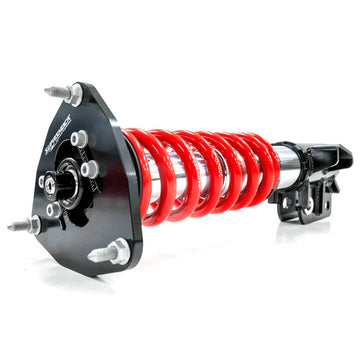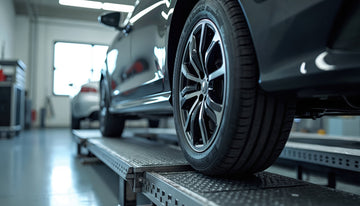Coilovers improve performance by enhancing the overall driving experience.
Through their adjustable features and high-quality components, coilovers have the ability to significantly enhance a vehicle's handling, cornering stability, and balance. By allowing for precise adjustments in spring rates, damping, and ride height, coilovers offer the flexibility to tailor the suspension setup to individual preferences and driving conditions.
This customisation translates into improved traction, better braking capabilities, and heightened responsiveness. With their ability to optimise suspension geometry and reduce body roll, coilovers empower drivers to tackle corners with confidence and precision.
Benefits of Coilovers: Enhance Handling, Stability, and Control for an Optimal Driving Experience
When it comes to optimising your driving experience, coilovers are an essential upgrade for any car owner. These suspension components not only improve the overall performance of your vehicle but also offer a range of benefits that make them worth the investment.
One of the key advantages of coilovers is their ability to enhance handling. By allowing you to fine-tune your suspension settings, coilovers provide precise control over how your car responds to different road conditions. Whether you're navigating sharp corners or cruising on straightaways, coilovers ensure that every movement is smooth and controlled.
In addition to improved handling, coilovers also contribute to enhanced stability. With their adjustable ride height feature, you have the flexibility to lower or raise your car according to your preferences. Lowering the ride height not only gives your vehicle a sleeker appearance but also lowers its centre of gravity, resulting in better stability during high-speed manoeuvres.
Another aspect worth mentioning is that upgrading to coilovers can significantly improve the quality of daily driving experiences. Unlike stock suspensions which prioritise comfort at the expense of performance, coilovers strike a perfect balance between both aspects. You'll enjoy increased responsiveness without sacrificing overall comfort levels.
It's worth noting that coilovers are not limited to performance cars; they can be installed on a wide range of vehicles, from daily drivers to sports cars. Regardless of your car's make or model, upgrading to coilovers will undoubtedly elevate your driving experience.
FAQs
How do you measure a car's performance?
Measuring a car's performance involves evaluating various key metrics, such as;
- Acceleration: Measure how quickly a car can go from 0 to 100 km/h.
- Top Speed: Evaluate the maximum speed a car can achieve under ideal conditions.
- Braking Performance: Assess the car's ability to decelerate and come to a stop from a specific speed.
- Handling and Cornering: Evaluate the car's ability to navigate corners and maintain stability.
- Lap Times: Measure the time it takes for a car to complete a lap on a racetrack.
- Power and Torque: Assess the engine's performance based on horsepower and torque output.
- Weight-to-Power Ratio: Calculate the ratio of a car's weight to its horsepower, indicating power-to-weight efficiency.
- Vehicle Dynamics: Consider factors such as lateral g-forces, roll angles, and stability control systems that affect a car's performance and handling.
What kinds of coilovers are available?
A wide range of coilovers are available to cater to different vehicle types, driving styles, and performance goals. Here are some common types of coilovers:
Coilover sleeves
Coilover sleeves are a popular and affordable option for those seeking to lower their vehicle's ride height while maintaining the use of their factory shock absorbers. These sleeves are designed to be installed over the existing shocks, allowing for adjustment of the vehicle's ride height by threading the sleeves up or down. While coilover sleeves offer the benefit of adjustability, it's important to note that they do not provide damping adjustment, limiting their ability to fine-tune the suspension's performance characteristics.
Non-shock adjustable coilovers
Non-shock adjustable coilovers, also known as "non-dampening adjustable" coilovers, feature threaded bodies that allow for ride height adjustments without altering the shock's damping characteristics. These coilovers typically offer a range of preset damping rates designed to provide a balance between comfort and performance. Although they lack the ability to fine-tune damping, non-shock adjustable coilovers still offer improved handling and customisation compared to stock suspension setups.
Shock adjustable coilovers
Shock adjustable coilovers represent a significant upgrade over non-shock adjustable counterparts. With shock adjustable coilovers, users can independently adjust both ride height and damping settings. This allows for precise tuning of the suspension system to match specific driving preferences and conditions. By altering the damping, drivers can optimise the balance between comfort and performance, ensuring a more responsive and controlled ride.
Shock adjustable coilovers with camber kit
Shock adjustable coilovers with a camber kit offer an additional feature to address alignment and cornering performance. Camber refers to the vertical tilt of the wheels, and excessive or uneven camber can negatively impact tire wear and handling. Coilovers with a camber kit provide the ability to adjust the camber angle, allowing for improved tire contact with the road during cornering. This feature is especially beneficial for enthusiasts who participate in motorsports where precise wheel alignment is crucial for optimal performance.





